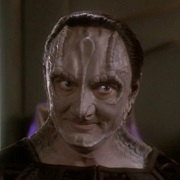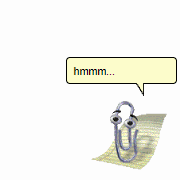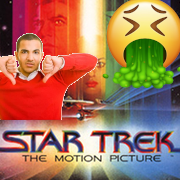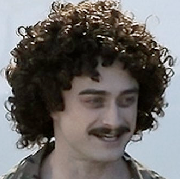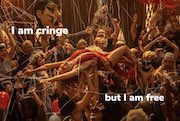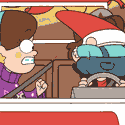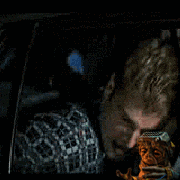|
If you’ve ever seen Jason X, that’s basically an episode of Lexx.
|
|
|
|

|
| # ? May 26, 2024 08:11 |
|
Gripweed posted:If you’ve ever seen Jason X, that’s basically an episode of Lexx. Colin!!
|
|
|
|
I like that Colin apparently worked on every single Canadian Sci Fi show and movie to have ever existed. He is ageless.
|
|
|
|
ProperCauldron posted:Cold War Nuclear War movies kick rear end. Filmmakers literally trying to stop the end of the world is like a different universe from Movie to create Happy Meals and fill Walmart isles. hosed up part is that it actually worked with the day after and reagan
|
|
|
|
Hackers film 1995 posted:people always talk about the movie Threads as this important “horror” movie or “super depressing” movie of note so i watched it last night. the whole time i just kept thinking that the movie was interesting and of note but not doing it for me. maybe it was too cheap looking or maybe everyone was just way too british. but then honestly i had trouble falling asleep haha. Threads has perhaps the most unfortunate one-and-done acting resume I've ever seen. 
|
|
|
|
wow. colin DID work on lexx
|
|
|
|
Crescent Wrench posted:Threads has perhaps the most unfortunate one-and-done acting resume I've ever seen. Whomst among us has never played that role?
|
|
|
|
dreezy posted:hosed up part is that it actually worked with the day after and reagan Also IIRC he watched wargames and was like "wtf hackers can do what? As president I'm ordering we get our computer security locked down" As it turns out it actually was pretty awful IRL
|
|
|
|
Crescent Wrench posted:Threads has perhaps the most unfortunate one-and-done acting resume I've ever seen. Hell it's a memorable performance why try and top it?
|
|
|
|
Gripweed posted:Whomst among us has never played that role?
|
|
|
|
Cubone posted:hey I'm not a woman 
|
|
|
|
Tunicate posted:Also IIRC he watched wargames and was like "wtf hackers can do what? As president I'm ordering we get our computer security locked down" which of course brings everything back to star wars
|
|
|
|
drat maybe we shouldnt have hired an actor to be the president
|
|
|
|
TONIGHTS DISCORD MOVIES starting at 8 est 1. Blood Legend  2. Ebola Syndrome  3. Horror Express 
|
|
|
|
i watched ebola syndrome on 4k a while back. i remember it being interesting but cant remember if i actually liked it.
|
|
|
|
Whoever was upset about the nipple av, I finally posted bad enough to get it replaced. You're welcome.
|
|
|
|
Considering the takes I've seen these last 3 months, I have to congratulate you on having the take bad enough about the james clavell ouvre to get an av over it
|
|
|
|
In Dave Moore’s multipart essay on Taylor Swift, ‘How You Get the World’, he speculates that the media conditions of the late 2000s produced a generation of ultimate media: acts and brands and series that came from the era of universal appeal but which persisted into the era of Spotify and Netflix, where we are all so micro-served in our wants and desires that the sun has set on fame or success at that level. There may be more acts as talented as the Beatles, but their success will be diffuse, celebrity arriving in dribs and drabs instead of a supernova explosion of fame. Taylor Swift, as you might expect, is Moore’s primary example of this in modern music. For cinema, Moore cites the Marvel Cinematic Universe (MCU). For over ten years the MCU was inescapable in pop cinema, an Imperial march through the box office the successes of which were only accentuated by the tragicomic failure of every attempt to replicate it. Warner Bros sank their own battleship trying to ‘fix’ Justice League to the Marvel formula; the less said about Universal’s ‘Dark Universe’ the better. Even Disney — who bought Marvel wholesale — couldn’t keep Star Wars going for more than a handful of films. Now it seems likely that we are in the twilight of the MCU, with tepid entries like the sequel to 2019’s billion-selling Captain Marvel failing to make back its budget and upcoming fare like Deadpool 3 leaning on the ageing, uncertain legacy of the Fox X-men films for appeal. The Achilles’ heel of the MCU was always the unbroken chain of continuity; the fear of missing an essential entry and slipping from the zeitgeist. In this Disney have prepared the MCU a shallow grave, the integration of streaming service TV shows into the core narrative turning an occasional pleasant visit to the cinema into something you need to devote hours of downtime to keeping up with. Even a smart director like Sam Raimi can’t make an attachment to the six hours of 2021’s WandaVision completely optional. Taylor Swift by contrast has retained her throne, for now, as a new round of reviewers tangle with the fear that her popularity might be driving their positive coverage rather than vice-versa. The roles of critic, taste-maker and customer advocate are never as intertwined as they seem and fresh off her enormous stadium tour and movie Swift seems likely to shrug off any negative reviews for her new album The Tortured Poets Department, released April 19th (Paste’s review was posted anonymously for fear of fan reprisals). A double album is one of the traditional marks of an act falling to hubris, and Swift’s detractors might be hoping that 31 songs with lyrics like “What if I can’t have us/I might just not get up” will be enough to bring her down to earth again. Personally I wouldn’t take that bet. This kind of uncomfortably proximate emoting is Swift’s trade, her authenticity, and what might appear cringeworthy to outsiders is the beating heart of her appeal to fans. A world away from all this but on the same day, Zack Snyder finalises his own double album with the release of Rebel Moon Part 2: The Scargiver. The journey of this one seems to have taxed whoever is in charge of managing releases at Netflix to a point beyond all comprehension; it’s hard to imagine a more unhinged market strategy than “two films, each with two cuts, but not at the same time, and they’re each about five months apart”. Absence makes the heart grow fonder, and five months is not long enough to forget that the first part suffered deeply from being cleft in two like this. Arriving too soon to demand a rewatch of the first part, and effortlessly defeated in epic stakes by the recent blockbuster success of Villeneuve’s Dune, this latter half has not been set up for success. As with Ms Swift though, Snyder has a habit of beating the odds and confounding the critics — who may never forgive him for the trump card he pulled on all the nay-sayers and industry insiders by seeing his Justice League through to completion. In my review of Rebel Moon Part 1: A Child of Fire I speculated that Snyder was returning to his roots in doling out crowd-pleasing action with simple moral messages, with the risk being that Star Wars was yet another revered cultural artifact he might be perceived as mistreating. Star Wars is serious business, even now, and there’s something typically audacious in Rebel Moon’s refusal to emulate it too closely. There’s no force, no monks, no robot peasants. In this second part there isn’t even any planet hopping save for flashbacks and recaps. Snyder is mythopoetic where Lucas is spiritual — what unites his band of adventurers is life, living and working, and much of the first half of Part 2 is given over to seeing the protagonists of Rebel Moon working the land in common with the villagers they have come to save, sharing food and drink and dance. It’s an earnest message that casts into relief the difficulty of such human connection even in Snyder’s own superhero efforts — Batman v Superman in particular hinging on the distance Superman’s existence puts him and the people he aids. The MCU often inelegantly sidestepped this by having the heroes defend property in the quickly achieved absence of people; cars and buildings and other totems, Thanos meeting his final defeat when he knocks over the campus building. The lack of humanity can become distracting — the Avengers famously share a shawarma, but they don’t share it with Happy Hogan. Rebel Moon is deeply concerned with human behaviours — love, work, sex, violence — in a way that is often absent in modern films. Being in essence a two-hour final act, there’s not much room for structural game-playing here. We get an hour or so of beautifully shot grain harvesting with the expected nods to Magnificent Seven where they should be, and the brief story of how Admiral Noble got his groove back — in a joke that’s just a bit too arch for this movie, we’re repeatedly told that the resurrection process (a visual reference to The Matrix) may have turned him into a deranged psychopath. Naturally, his behaviour doesn’t change at all. Following this we get the scene which most resembles the first movie, as the members of the troupe who didn’t get to show off their deal in that movie fill in the gaps here in a series of vignettes. This includes a delightfully theatrical recounting of Kora’s killing of the magic princess, beginning with the King deciding to call his biggest, ugliest ship the ‘Peacemaker’ and ends with the string quartet playing a gun-toting Kora out of the room. It’s playful and stagey without being ridiculous or self-indulgent. More so than Part 1, the new film does flaunt some significant references to Lucas’ work. The invasion of the village, with walker tanks being airdropped in alongside ground troops as dust flies past the camera is a loving reproduction of the final battle from Attack of the Clones, and the topsy-turvy swordfight between Kora and the resurrected Admiral Noble at the climax has a similar sense of outlandish fun as the Obi-wan/Anakin duel in Revenge of the Sith, along with the spectacle of a great flagship crashing through the atmosphere. Closing the film out on a funeral pyre also highlights the affection this film has for that series. The comparison does throw up some areas where Rebel Moon’s reach exceeds its grasp, with the personal enmity between Noble and Kora always seeming more like pathetic competition than ideological clash. It’s not just that Vader is Luke’s father, it’s also that he’s a symbol of paternal authoritarianism to Luke’s hippy freewheeling. Kora on the other hand, though we’re shown that she has instinctually picked up the communitarian values of the village, is herself a product of the same Empire that Noble serves. What the interpersonal conflict doesn’t show though, the incidental details are happy to express — the extended sequence of communal labour is contrasted with what we see of the inner workings of the enemy dreadnought, with a clear reference to the class strata of Titanic whereby workers in the engine room shovel coal into great raging furnaces. Above this is some kind of spectral angelic computer, evoking Evangelion among other things, bound in a position of sedate submission as Kora installs explosives across its broad forehead, eyes flickering to light with the interaction. In the flashback, the senators of this Empire are aged and grotesque, the old stereotype of the Prussian noble, as they endorse Balisarius’s antiquity-themed coup. Old men of the future, in command as ever. There’s something pathetic in Noble’s repeated assertion that capturing Kora will win him a place on the senate — for all his love of the society he represents he is extremely blinkered about how it loves him. Notable by their absence, not compared to Star Wars but compared to the mode of nearly all modern genre films, are the quips. None of the characters of Rebel Moon are a Chris Pratt type and thank the heavens for it. There’s a confidence in the world of the film and the actions of the characters within it that liberates them from having to do the ritual ironic disavowal that pervades modern films. The villagers do not proclaim “oh drat!” on seeing the second wave of troops marching towards them because the villagers are in fear for their lives. The setting is taken seriously, and not just as a sort of pastiche the people within it are performing — the most obvious example of which being the world of The Marvels, where the planet of the sad refugee people is but a hop from the planet of people who just have to sing and dance all the time and so on. Rebel Moon is refreshingly straightforward: the soliders are competent and well-disciplined, the officers obey orders even if they disagree with them, and sensible decisions are made about tactics throughout. It’s a small thing, but it means when we then see Noble personally go on a trench warfare murder spree it’s exceptional rather than ludicrous. George Lucas always insisted that Star Wars was for children, and the comedic incompetence of the Stormtroopers was a reflection of that. Rebel Moon, with its R-rated director’s cuts hanging like phantasms in the distance, does not have such a commitment. With hindsight it may turn out that Snyder’s peak of creativity and collaboration was his trilogy for DC, and he won’t seek out such intimate, introspective work on the grand canvas again. It may be that among fans there is much handwringing and disappointment over his experiments with cinematography and writing and the other elements he has, until now, sought out talented partnerships for. It may even be that unlike stablemate Michael Bay, Snyder never sees a broader reappraisal among critics as an auteur (with the concept more out of fashion than ever). Rebel Moon Part 2 currently has 18% on popular review aggregator Rotten Tomatoes. Love and Thunder, a movie without a shred of the craftsmanship or soul that is present here, has 63% and is certified ‘Fresh’. Believing as many people have that critical consensus will build a universal (American) canon liberates a person from the tyranny of choice. There is no risk of feeling your taste to be inadequate when there is an objective numerical measure of its accuracy. But if the numbers are a fantasy, and the consensus was only ever a reflection of contingent aspects of production and not a guiding factor at all — if The Shawshank Redemption or Citizen Kane or Everything Everywhere All At Once is not in fact the greatest film of all time, certified as top of the list— then every person is in danger of being a philistine. This is a troubling thought. But more troubling is the idea that, captured by engines that only feed back to us what we already like, we end up with nothing but attempts to recreate the MCU. For as much as I don’t hate these films, we end up with The Marvels or Madame Web or Wonder Woman 1984 or Thor: Love and Thunder. Films made by committee, with artistic endeavour a secondary concern. As Snyder himself put it in a recent interview, we end up with the Happy Meal. Snyder’s work is unique and particular, and fervent in its earnestness. Despite all the homage and pastiche and the readily apparent melting pot of influences, Rebel Moon is an original sci-fi universe in an age of adaptations and sequels. Snyder, who once helmed the major competition to the MCU, knows the folly of trying to reproduce it. Even the clumsy sequel hook here is only that, a sequel hook. It’s not the work that destroys all the critics and haters — but then we had that one in 2021 and it didn’t last anyway. It’s just another decent movie by Zack Snyder. Perhaps for his next one he will take a leaf from erstwhile creative partner Christopher Nolan and leave genre behind entirely. Oppenheimer brought the intensity of a Batman film to historical biography. Perhaps Snyder could bring the rich visuals of Rebel Moon to philosophical fiction. Or perhaps he will keep producing these grandiose micro-epics for as long as Netflix will pay him. All things are possible. I would be sad to never see another film like Rebel Moon and I don’t know if another director is likely to make one. Everything’s filthy, the lens is constantly trained on the narrowest plane of interest and there’s a healthy, satisfying thunk to every noise and interaction. It’s not a new Star Wars — it may be that nothing can be a new Star Wars, nothing can be a new MCU, nothing can be a new Taylor Swift. But it’s an enjoyable movie by a director who is always pushing his own limits. The lousy division into two parts, the held-off pair of Director’s cut, the fancy lenses and lingering shots of grain and such may not be to everyone’s taste. Few things are. Cynics will sneer at the simple truisms like “connecting with people will help you break an addicition” or “mutual respect can bring people from different backgrounds together”. But Rebel Moon is authentic and honest in a way that will overcome all cynicism to those who care — an inimitable talent for reaching people that Zack Snyder shares with Swift — and that alone is more than enough to save it.
|
|
|
|
im not reading that gently caress you
|
|
|
|
Dr. Thoss posted:2. Ebola Syndrome both of these are pretty decent
|
|
|
|
Jose Oquendo posted:In Dave Moore’s multipart essay on Taylor Swift, ‘How You Get the World’, he speculates that the media conditions of the late 2000s produced a generation of ultimate media: acts and brands and series that came from the era of universal appeal but which persisted into the era of Spotify and Netflix, where we are all so micro-served in our wants and desires that the sun has set on fame or success at that level. There may be more acts as talented as the Beatles, but their success will be diffuse, celebrity arriving in dribs and drabs instead of a supernova explosion of fame. Taylor Swift, as you might expect, is Moore’s primary example of this in modern music. For cinema, Moore cites the Marvel Cinematic Universe (MCU). I know, right?
|
|
|
|
In order to convince you that Rebel Moon is good please first allow me to incessantly mention a bunch of things that massively blow
|
|
|
|
LanceHunter posted:
Ikr?
|
|
|
|
Jose Oquendo posted:In Dave Moore’s multipart essay on Taylor Swift, ‘How You Get the World’, he speculates that the media conditions of the late 2000s produced a generation of ultimate media: acts and brands and series that came from the era of universal appeal but which persisted into the era of Spotify and Netflix, where we are all so micro-served in our wants and desires that the sun has set on fame or success at that level. There may be more acts as talented as the Beatles, but their success will be diffuse, celebrity arriving in dribs and drabs instead of a supernova explosion of fame. Taylor Swift, as you might expect, is Moore’s primary example of this in modern music. For cinema, Moore cites the Marvel Cinematic Universe (MCU). I almost got through the first paragraph.
|
|
|
|
Kingo Ligma posted:Whoever was upset about the nipple av, I finally posted bad enough to get it replaced. You're welcome. پندار نیک، گفتار نیک، کردار نیک
|
|
|
|
literally the only reason we think we have 7 continents is the people of this weird tiny far western part of asia are so racist and dumb that they demand to be defined separately as a completely stupid and made up concept called "europe" that does not exist and never has and never will the people in this "europe" are literally the only ones on earth who hear the word "asian" and think of anything west of the indian subcontinent, and their opinions can be discarded because, as established, their concept of what a continent is is based on racism and being dumb hence kingo was correct. q.e.d.
|
|
|
|
Cubone posted:literally the only reason we think we have 7 continents is the people of this weird tiny far western part of asia are so racist and dumb that they demand to be defined separately as a completely stupid and made up concept called "europe" that does not exist and never has and never will Too long for a custom title.
|
|
|
|
Jose Oquendo posted:In Dave Moore’s multipart essay on Taylor Swift, ‘How You Get the World’, he speculates that the media conditions of the late 2000s produced a generation of ultimate media: acts and brands and series that came from the era of universal appeal but which persisted into the era of Spotify and Netflix, where we are all so micro-served in our wants and desires that the sun has set on fame or success at that level. you left off the most important part at the end "If you appreciate my writing, watch my video essay Sixteen Attempts to Talk to You About Suicide Squad."
|
|
|
|
TIP posted:you left off the most important part at the end Huh, usually you're happy to hear about a failed attempt.
|
|
|
|
Endless Trash posted:In order to convince you that Rebel Moon is good please first allow me to incessantly mention a bunch of things that massively blow I finished the first movie last night. It was not very good. I don't know what Zack Snyder has against people actually physically watching his movies. Even explosions were dark, which I guess is an achievement all to itself. Now there is a wacky band on its way back to the farm to protect the grain. Maybe it is space grain? I hope it is space grain. Anyways, I give it 0.5 comfy sweaters.
|
|
|
|
I was pretty on board with a taylor swift roast until I read further and realized what I was reading. gently caress you jose
|
|
|
|
Cubone posted:literally the only reason we think we have 7 continents is the people of this weird tiny far western part of asia are so racist and dumb that they demand to be defined separately as a completely stupid and made up concept called "europe" that does not exist and never has and never will Goddamn someone actually gets me. Thank you.
|
|
|
|
Jose Oquendo posted:In Dave Moore’s multipart essay on Taylor Swift, ‘How You Get the World’, he speculates that the media conditions of the late 2000s produced a generation of ultimate media: acts and brands and series that came from the era of universal appeal but which persisted into the era of Spotify and Netflix, where we are all so micro-served in our wants and desires that the sun has set on fame or success at that level. There may be more acts as talented as the Beatles, but their success will be diffuse, celebrity arriving in dribs and drabs instead of a supernova explosion of fame. Taylor Swift, as you might expect, is Moore’s primary example of this in modern music. For cinema, Moore cites the Marvel Cinematic Universe (MCU). 
|
|
|
|
Imagine how much that person will have to write when they release the finished version of the movie
|
|
|
|
heres the thing yall: china aint real
|
|
|
|
Hollywood producer after a movie bombs internationally:That DICK! posted:heres the thing yall: china aint real
|
|
|
|
never been more happy to be illiterate
|
|
|
|
Kingo Ligma posted:Whoever was upset about the nipple av, I finally posted bad enough to get it replaced. You're welcome. Nooo my nipple bro
|
|
|
|
i just want to know where he thought iran was prior to today. africa? mexico?
|
|
|
|

|
| # ? May 26, 2024 08:11 |
|

|
|
|











